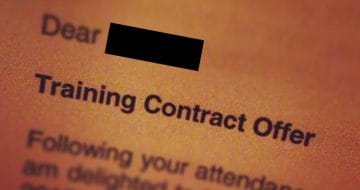A paralegal opens up about wellbeing challenges associated with the new assessment

The opinion you never asked for — I passed the SQE1 exams whilst working full-time. I’m still recovering from the shockwave.
After what felt like ages, the day finally came: SQE1 exam results day. The email came into my inbox, promptly followed by a wave of nausea. Clicking on the link, my eyes were drawn to that coveted word, “PASS”. By some miracle (and when I say miracle, I mean it), I actually passed both FLK1 and FLK2.
Since then, I have been in perpetual disbelief that I somehow managed to pass the exams, having left the exam centre on both occasions feeling utterly defeated, and perhaps not quite the same person as when I went in. I am left with overwhelming ambivalence about the whole experience.
Whilst I am one of the lucky ones to have passed the exams, I can’t help but feel almost like a fraud — why should I, who achieved scarcely over the pass mark, be able to toast champagne with my colleagues and family, whilst the candidate who lost out on a handful of correct answers, spends the rest of the week under their duvet, battling with the prospects of having to re-enter a mental sinkhole?
I was scrolling through social media on the exam results day, and it truly made for sorry reading. I flicked through personal accounts of the mental and emotional turmoil in which participants found themselves when preparations began, the life moments that were sacrificed, all in efforts to devote every waking moment to revising. Oddly, it felt comforting to read that others had the same experience as me: troubled sleep, anxiety, reclusiveness and spiralling emotions.
Perhaps it was a combination of the sheer expanse of material covered by the exams (including areas of law that were entirely new to me), the necessity to rote learn over a period of many months in efforts to commit the content to memory, and the relentless use of red-herrings within the MCQs aimed at throwing you off course, that made the process so disconcerting.
It seems to me that this sort of “rigorous professional assessment”, as the SRA christened it, cannot be a sustainable way of testing wannabe lawyers to ensure they are ‘up for the job’; to put them on the back-foot before they even begin in practice. Of course, it is fair to say that to be part of the legal profession is a privilege, and the key shouldn’t be handed over as a matter of right. However, I wonder about the long-term impact on budding lawyers of this style of gateway examination, which is not cheap by any means, and appears to foster mental and emotional anguish.
Reflecting on my experience, I would offer up one meagre tip to success: don’t attempt to work a full-time job whilst studying for these exams. The format demands a huge amount of your time, commitment and emotional energy; impossible to relinquish alongside a full-time job. However, for a large quantity of candidates, I would imagine the alternative is simply not an option. All of us have obligations, whether financial or otherwise. We rely on every last penny of our monthly pay packet. The thought of reducing that monthly income seems an unreasonable ask, and it wouldn’t seem sensible to add to the heavy academic burden of the SQE with an equally heavy burden of worrying about how one is going to pay the rent.
In fact, I would go further and say: it’s not actually as simplistic as avoiding the inevitable balancing act of full-time work and study. A huge dose of luck is involved as well. Luck in the particular questions that arise on the day (and whether, by pure chance, your tired, tired brain is able to conjure the relevant legal concept within the 90-seconds you have to answer the question), and that you are able to engage mental stamina as the fourth hour passes on exam day.
It’s important that I acknowledge the fact I was able to approach these exams from an incredibly privileged position. I have the support of a partner to carry the domestic burdens of daily life that I would otherwise have abandoned. I don’t have any disabilities that would make accessing the exams even more challenging. I have an extremely present family, and work for a firm which supported me through the process. The thought of taking on the SQE without all of the above seems untenable.
My final thoughts would be for those who are yet to attempt the exams, or who have unfortunately not passed this time around. Maybe you are staring down the barrel of undertaking your preparation for a second or third time. Yes, the exams are meant to be hard — we’ve heard that a million times. But that doesn’t actually help. The inescapable struggle with the mental element of this process, which is arguably more difficult to traverse than learning the exam content itself, is justified, and I’m sure, felt deeply by all candidates. If you feel like you might, or indeed have, ‘failed’ the SQE1, I would say that it speaks more to the precarious system than to your true abilities, and certainly does not determine how successful a lawyer you will be.
SQE Survivor is an LLB graduate and currently works as a paralegal.


